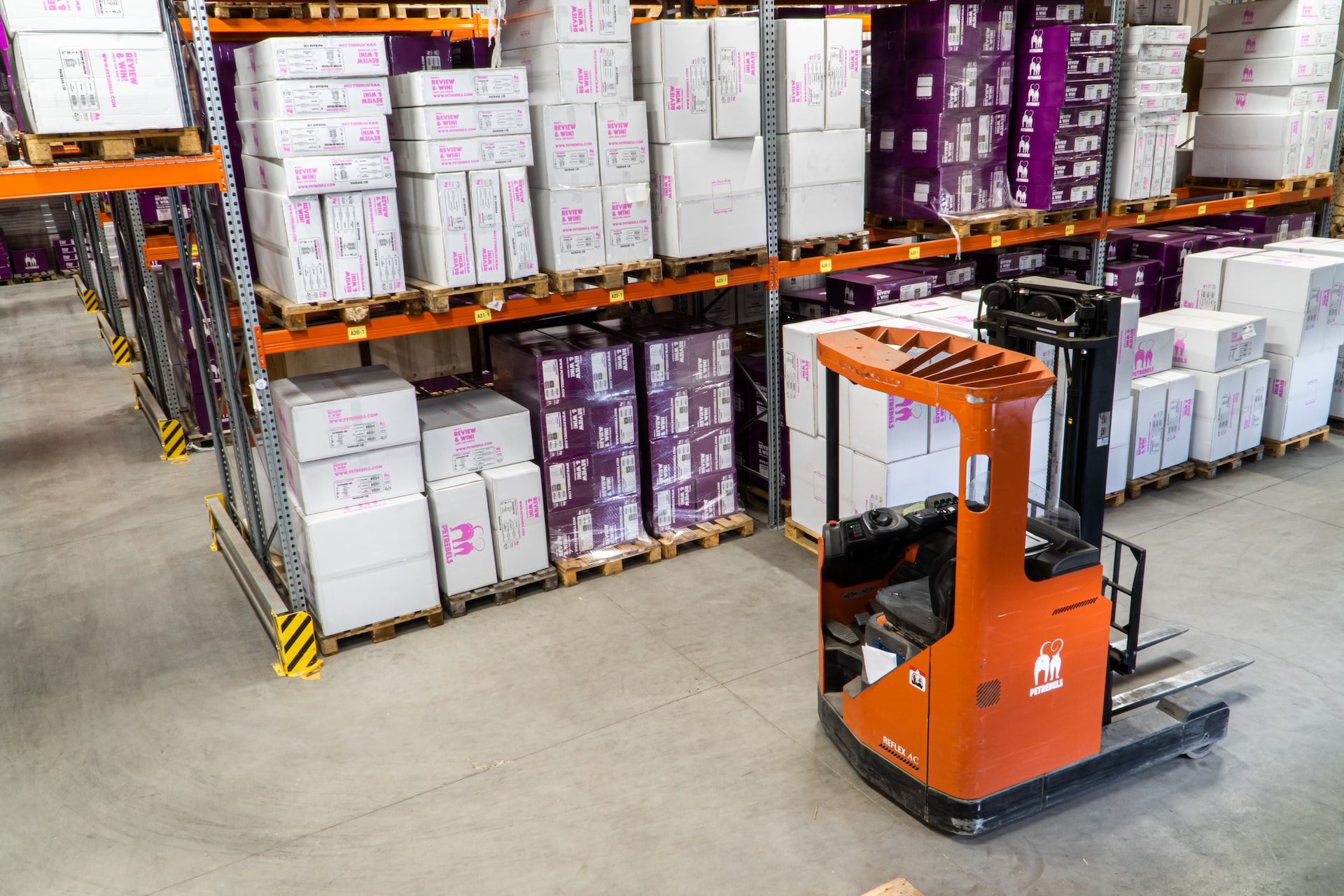In today's fast-paced and competitive business world, it's more important than ever for companies to have efficient and streamlined processes. Implementing an ERP (Enterprise Resource Planning) system is one approach to accomplish this.
An ERP system is a software solution that integrates all of a company's key business processes, including finance, HR, inventory, manufacturing, and more, into a single, centralized platform.
By doing so, an ERP system can help businesses to operate more efficiently, make better decisions, and ultimately, achieve greater success. In this context, it's clear why more and more businesses are recognizing the need for an ERP system and are investing in one to stay ahead of the competition.
- ERP: Enterprise Resource Planning
- Why ERP is Important for Businesses?
- ERP Enables Businesses to—
- Various Business Segments in Small and Medium Business Sectors
- Traders and their Sub-Segments
- ERP's - The Solution Provider for Small Businesses
- Wrapping Up
- How Deskera Can Assist You?
Let's get started!
ERP: Enterprise Resource Planning
ERP stands for Enterprise Resource Planning. ERP software comprises powerful and strategic business process management tools that can be used to manage information within an organization.
Even though most companies and organizations operating today are different, they all face a common challenge. In order to stay competitive in today's business environment, they need a dependable and efficient way to store and access information.

Globally numerous businesses are operating, each in its unique way.
There are multiple business segments out there, each of which has its own set of processes and attributes. Is it possible to manage each of these using a single business software?
ERP systems usually integrate all facets of an enterprise into one comprehensive information system that individuals can access across an entire organization.
More businesses of all sizes today are implementing Enterprise Resource Planning (ERP) systems more than ever before. Why is that so
Here are some of the main reasons and benefits why organizations are implementing and using ERP systems:
- Accounting & Finance Management
- Powerful reporting and forecasting tools to make informed decisions about the future of your business.
- Provides business and management leaders with real-time visibility into all operations
- Provide instant access to global supply chains
- Enable business leaders to identify challenges, uncover opportunities, and make faster decisions that impact different areas of their businesses.
- Help automate and streamline tedious tasks and redundant processes.
- Give employees the tools and data they need to be successful
- Provide a single point of truth for organizations
- It can often be accessed from anywhere (off-site and from mobile devices).
- Help increase productivity among your team
- Make it easier for teams to collaborate with each other, and with third-party vendors.
- Keep data secure, and help you ensure that your business continues to operate in compliance with global regulatory laws and guidelines.
A good ERPs or accounting systems should empower the user to configure the system so that the system adapts per their needs, rather than the user adapting to its processes. In today's world of business softwares, ERPs are designed such that users from any business segment can easily use them as per their needs.
Why ERP is Important for Businesses?
ERP (Enterprise Resource Planning) systems are important for businesses for several reasons:
Streamlining processes: ERP (Enterprise Resource Planning) systems can help businesses streamline processes in several ways:
- Standardization: ERP systems can standardize business processes across departments and locations, helping to reduce inconsistencies and errors. This improves operational efficiency and reduces the risk of delays or disruptions.
- Automation: Routine chores like data entry and report production can be automated by ERP systems, freeing up staff members to work on more strategic projects. It also saves time and resources while lowering the possibility of errors.
- Real-time data: ERP systems give users access to data in real-time, enabling businesses to act swiftly and decisively. Because of the increased reactivity and agility, organizations can respond swiftly to shifting market circumstances.
- Collaboration: ERP systems can improve collaboration by providing a single source of truth for data, enabling employees to work together more effectively. This lowers the possibility of misunderstandings and makes sure that everyone is striving for the same objectives.
- Analytics: ERP systems provide tools for data analytics, allowing businesses to gain insights into their operations and identify opportunities for improvement. This supports companies in making data-driven decisions and streamlining their procedures to increase productivity.
Inventory Management:
Businesses that are growing have a lot to worry about when it comes to monitoring and managing their rising inventory levels.
Using barcoding, RFID tags, and serial numbers, ERP keeps track of your inventory at every stage of the supply chain. These technologies allow you to monitor the inventory levels in various warehouses, the items that are being delivered, and the products that are on the shelves and available for purchase.
The pick, pack, and ship procedure are considerably optimized by the improved warehouse visibility, which completely eliminates all ambiguity.
Inventory monitoring also improves reporting since tracking systems generate more accurate data. Users can set up specific KPIs to monitor which products sell the quickest, which indicates more demand, and which cause increased carrying costs.
Warehouse managers may obtain real-time data on their inventory and make more precise business decisions thanks to the increased precision afforded by ERP.
Enhanced Resource Management and Production Planning
Businesses can enhance production planning and resource management in a number of ways with the use of ERP (Enterprise Resource Planning) systems:
- ERP handles manufacturing as well as inventory management. ERP provides information on all facets of manufacturing, including shop floor activities. Customers can now maximize capacity by optimizing labour, equipment, and production schedules.
- Bill of Materials (BOM): ERP also manages your fixed assets and Bill of Materials (BOM). Users may simply create and amend BOMs with this software, and they can also keep track of all past adjustments. With the help of fixed asset management, users may schedule equipment maintenance to reduce unscheduled downtime, increasing profitability and relationships with your supply chain.
- Resource Allocation: ERP systems can help businesses to allocate resources more effectively by providing real-time visibility into resource availability, such as labor, machinery, and raw materials. This helps businesses to optimize resource usage, reduce waste, and improve efficiency.
- Quality control: ERP systems can assist companies in putting quality control procedures in place, ensuring that goods are produced at a constant level of quality. Businesses may save waste, increase customer satisfaction, and lower the likelihood of product recalls by increasing quality control.
- Maintenance Management: ERP systems provide tools for maintenance management, allowing businesses to schedule preventative maintenance, monitor equipment performance, and reduce downtime. This makes it more likely that resources will be accessible when needed and that production will go smoothly.
- Improved Data Accuracy and Accessibility: An ERP system offers a lone source of data accuracy. It ensures that data is accurate and up-to-date, eliminating discrepancies and inconsistencies between departments. ERP systems also provide real-time access to data, allowing employees to make informed decisions quickly and efficiently.
Better Financial Management
ERP (Enterprise Resource Planning) systems can help businesses achieve better financial management in several ways:
- Accurate and Timely Financial Data: ERP systems provide real-time access to financial data, making it easier for businesses to track revenue, expenses, and cash flow. This facilitates swift and precise decision-making for enterprises.
- Standardized accounting processes: ERP systems standardize accounting processes, ensuring that all financial transactions are recorded consistently and accurately. By doing this, the likelihood of errors is decreased, and financial reporting accuracy is increased.
- Financial planning and analysis: ERP systems give firms the resources for financial planning and analysis, enabling them to make financial models, forecasts, and budgets. As a result, firms are better able to plan their future investments and expenses.
- Automated Financial Processes: ERP systems can automate financial processes, such as invoicing and accounts payable, reducing the time and resources needed to complete these tasks. This can save businesses money on labor costs and improve the efficiency of financial operations.
Risk and Compliance Management Made Simple
Keeping up with all the regulations imposed on your company as it grows and conducts business in different countries can be difficult. The myriad environmental, information security, and human resources requirements have an impact on even small local businesses.
The good news is that many ERP solutions were created with these rules in mind, making it easier for you to manage compliance on every level. ERP software also includes auditing features to assist in tracking things like chemical use and tax responsibilities. Making reports and submitting them to the proper regulatory bodies is made very simple as a result.
ERP also frequently includes risk management features.
Since accounting errors are less likely to occur thanks to this solution's improved reliability and accuracy, financial management as a whole improves.
Customers of forecasting software can also foresee events in terms of labour, money, and demand. Using the information at your disposal, you can create plans for your deadlines, finances, and product development that are more secure.
Customer Experience Is Improved
A 360-degree perspective of the client provided by an ERP system helps enhance customer service. This enables companies to offer individualized service and assistance to clients by better understanding their needs and preferences.
Enhances Productivity
The employment of conventional methods makes avoiding boring activities impossible. It used to take hours for employees to do duties like processing orders, managing timesheets, preparing reports, and monitoring inventory levels.
These procedures not only take time, but they also lower staff morale and put you at risk for mistakes made by people. After entering the same line of information into several forms for the countless times, even the greatest staff members are susceptible to making mistakes.
With the right technology, your most repetitive tasks can be automated, thanks to an ERP. The database in ERP software allows the system to efficiently complete complicated computations and eliminates superfluous labour, such as data entry.
By allowing your team members more time to accomplish thoughtful work, this raises your labour ROI. ERP increases your company's production, effectiveness, and profitability as a result.
ERP enables Businesses to—
1. Share Data and Information
Connect and connect every department in your company for easy data and information sharing between divisions and faster operations.
2. Increased Throughput
Without hiring more staff or expanding your operations, you can enhance throughput by automating processes, eliminating unnecessary jobs, and enhancing shop efficiency.
3. Obtain Business Intelligence
Improve your commercial savvy Track development, productivity, and performance with reliable data and reporting. You'll gain a greater understanding of your company as a result, which will aid in your decision-making.
Various Business Segments in Small and Medium Business Sectors
Let us start by looking at the small and medium businesses sector and their pain points:-
Wholesale Traders
The SME segment comprises a large number of traders. Wholesale and distribution traders typically require the following processes to be functioning smoothly:-
- Simple and easy to track sales/purchase processes
- Strong Receivables & Payables Management modules
- Statutory Compliance
- Support for Contact and Address Management - the wholesale traders deal in large volumes of purchases and even larger sales volume. Each of their customers may have multiple shipping addresses. Hence the system should be able to handle that easily.
- Inventory Management – wholesale traders, require a flexible inventory management system that can accommodate varying product attributes. It should also generate the set of reports needed by the wholesale traders from time to time.
- One too many bulk email campaign management
Other than the above, depending on the goods segment the business deals in, the accounting system must capture all attributes either via custom fields or any other method.

Retail Traders
Retail Traders like wholesale traders are also large in numbers in the SME Segment and require a solution to manage their invoicing efficiently. They often have multiple users generating invoices simultaneously. Hence, the system should be able to manage concurrent access to the invoicing module and help generate the invoices quickly.
An essential aspect for a retail inventory management is also the inventory part, as they need to track inventory levels, receive them in warehouses and dispatch them as per need.
Because the number of sales invoices is huge in this case, the dispatch team needs a robust tool to track each order's status. Moreover, we need to make sure the dispatched goods are the same as the ones included in the invoice.
In addition to the above, outstanding management is another critical aspect that requires regular attention. Depending on the types of goods you sell, you may need a serialized inventory or multiple attributes with the product master.
Certain softwares like Deskera, are specifically made to cater to the needs of small business's globally.
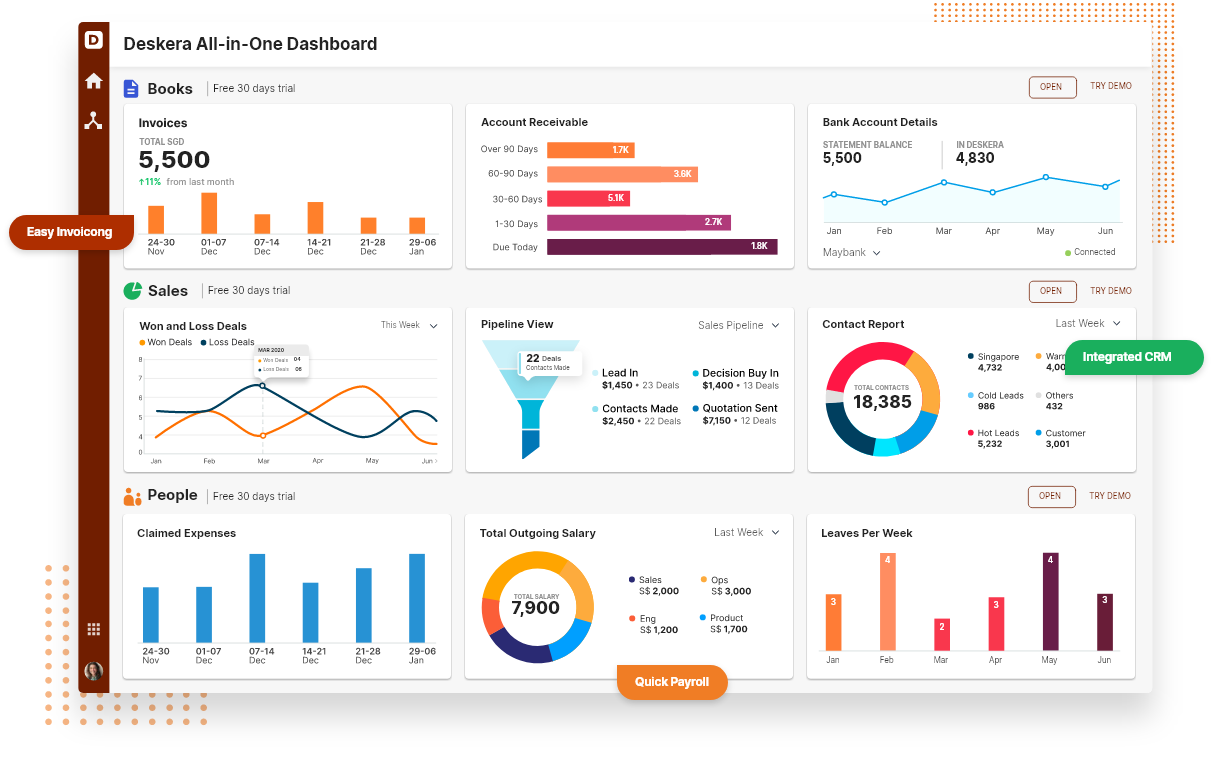
Traders and their Sub-segments
Under both retail and wholesale traders, there can be multiple sub-segments. Let us take a look at some of these sub-segments in detail below:-
Electrical and Electronic Goods Suppliers
Require serialized inventory management and outstanding management modules. Moreover, their SKUs can be large in numbers, so the system should be robust to handle a large data set.
Household Goods
They may require the ability to store goods under multiple brand names, with various attributes like size, color, product type, etc. The system should maintain inventory in this manner and generate the relevant MIS reports required later on.
Invoicing and receivables management needs to be efficient for this segment too.
Auto Parts Dealers
This segment of auto dealers experiences frequent price changes in its products, so maintaining price lists is a must-have feature along with price list import features. The inventory management system has to be robust as the SKUs can be large in numbers, and the MIS (Management Information Systems) report should help the business owner decide how much stock to keep and when to reorder.
Industrial Goods
For the industrial goods segment, the product master should be flexible enough to accommodate various part numbers, detailed descriptions, and specifications to be included in the invoicing. Moreover, this segment requires quality control at the procurement side to ensure the products which adhere to the desired quality are purchase and sold.
Iron & Steel
The iron & Steel segment is similar to industrial goods. Another aspect of this segment is that its inventory requires multiple Units of Measurements (UOM) tracking. Similar to industrial goods, their inventory may also require various attributes
Plastics Industry
This segment requires batch tracking specifically. Other than this, the other requirements are similar to the previous two industrial goods and iron & steel segments.
Pharmaceuticals
The pharmaceutical industry segment has some critical requirements, including managing large SKU sets and maintaining the expiry date for each lot of goods purchased. Batch management with Product master is an essential requirement here.
This industry is also price sensitive, so price list management is also required to ensure none of the products are ever sold above a certain price level. Reorder levels are essential along with lead time for each type of product.

IT Hardware & Software
This sector, firstly and most importantly, requires serialized inventory. Secondly, since they may procure large quantities of such products, Barcode enabled system is also a must so that data entry is hassle-free and without any mistakes.
The system must also be able to manage various commissions they receive from their vendors. A robust customer management portal is required as they have many repeat clients. The ERP integrated with CRM works very well for this segment. The integration framework is necessary to support the post-sales scenarios required for processes like AMC, installation, replacements, etc.
Food Processing and Trading
This food processing and trading segment requires strong inventory management, as the goods are perishable, and the system must track them efficiently. The usage of batch management with inventory products helps this segment, manage their raw materials efficiently, as the batches carry the expiry date with them. Another challenge that this industry faces is that the SKUs can be large in numbers.
Hence ,the ERP should offer a simplified solution to the warehouse team to track inventory reports and understand the stock level of each SKUs to be maintained. Their inventory masters also require multiple attributes to be able to generate MIS reports later on. Their inventory masters must also support multiple UOMs (Units of Measurements) as we can sell them in multiple packaging types. SKU management is another must-have requirement for this segment.
Lifestyle Goods
This segment may include furniture, furnishing, home decor items. This segment is inventory dependent and hence requires a very flexible and robust solution to manage inventory. It should support batch wise inventory, flexible field naming and creation mechanism, document designer, custom reports, etc.
Service Sector
The next sector that requires a solution suited to its needs is the service sector. Under this sector, there are again multiple segments which vary in their processes.
Majorly the service sectors require the ability to generate invoices as per client's requirements, flexibility to define terms & conditions as per agreement with the client in the invoice itself, and track receivables regularly. Other than this, depending on the segment given below, you can find the requirements in each of these.
Construction Companies
Their primary requirement is project-based accounting. Since they work on a project basis, but the material is bought for all projects together, it becomes essential for them to track which of the projects are profitable while which ones are not.
This requires the accounting to be done based on projects so that the MIS Reports help the management decide relevant actions that need to be taken for each project.

In addition to this, they may require frequent stock movement between projects, so the system should facilitate the same easily and track all items consumed at project sites.
Last but not the least, fixed asset management is required by construction companies to manage each of their assets being used at multiple locations.
NGOs
The NGOs also have similar requirements to any project-based company since they work on multiple projects across different geographies. They need to manage the funding they receive for a specific project and utilize it at the project site. Hence a project-based reporting system becomes quintessential for NGOs.
Another essential requirement for NGOs is flexibility in reporting formats as they have to report the P&L statement as per the format stipulated by the governing authorities. Since they do not operate on the principle of profit earning, they present it as an "Income & Expenses" report.
Restaurants
Restaurants and eating outlets typically require a quick invoicing tool, which can help manage the accounting and inventory both together. Since the restaurants rely on the purchase of perishable goods as raw materials, this segment requires real-time inventory tracking along with expiry date tracking as well.

This segment also requires a set of inventory transactions to adjust the stock as needed. Since the users need to generate invoices in large numbers, the system should facilitate a high-speed mechanism and easy-to-use interface.
IT/ITES
The IT segment belonging to the SME market requires project-based working to track billable hours for their clients. Other than that, the requirements are day to day accounting activities.
If, however, they have a channel via which they sell, then outstanding/receivables management is critical as invoices are raised very frequently to the same set of customers. Adherence to compliance is crucial for them, as well.
Healthcare & Tourism
For the tourism industry, the most critical aspect of an ERP is keeping track of expenses against each booking made. They need to keep a check on their costs to make sure they don't run into losses.
Vendor management is very crucial for them as their entire business depends on bookings made via vendors. Hence, payables and receivables management both are important.
Semiconductor Industry
The semiconductor industry is a highly specialized and complex sector that requires accurate and efficient management of resources, data, and processes. By streamlining their processes and increasing production and profitability, semiconductor companies can benefit from an ERP (Enterprise Resource Planning) system.
One of the key benefits of ERP for the semiconductor industry is its ability to provide real-time visibility into production processes and supply chain management. This can assist businesses in streamlining their manufacturing schedules, cutting down on lead times, and improving inventory control. With the help of an ERP system, semiconductor companies can manage the entire production cycle, from order processing to manufacturing and delivery, more efficiently.
Another benefit of ERP for the semiconductor industry is its ability to provide comprehensive data analysis and reporting. By providing real-time insights into production processes, equipment performance, and inventory levels, ERP systems can help companies to identify potential bottlenecks and inefficiencies, and take corrective actions. This can minimize downtime and raise the level of production quality generally.
ERP solutions can aid semiconductor companies achieve better financial management. By providing accurate and up-to-date financial data, ERP systems can help companies to control costs, manage cash flow, and improve profitability.
Energy Industry
The energy industry is a complex and dynamic sector that requires effective management of resources, operations, and finances. Energy companies face many challenges, including the need to manage assets effectively, optimize production schedules, and reduce costs. An ERP (Enterprise Resource Planning) system for energy industries can help energy companies to address these challenges and improve their overall performance.
The following advantages of ERP for the Energy business
planning and managing resources in compliance with project requirements and management of customer interactions
- Benefits include administration of documents, accurate development, and collaboration.
- On-time, within your budget, with adequate service management and delivery
- generating precise and precise invoices to enable quicker payment cycles
- keeping effective internal controls in place and keeping track of every transaction
- Saving time and improvising during performances
ERP systems can also assist energy companies in better financial management. By providing accurate and up-to-date financial data, ERP systems can help companies to control costs, manage cash flow, and improve profitability. This is crucial in the energy sector since changes in commodity pricing can significantly affect a company's bottom line.
Additionally, by giving energy firms real-time information into inventory levels, supplier performance, and delivery timeframes, ERP systems can assist them in managing their supply chains more efficiently. This can assist businesses in reducing lead times, increasing customer satisfaction, and optimizing their inventory levels.
Media and Entertainment Industry
All organizations in the media and entertainment industry can benefit from ERP systems since they can help you combine internal and external processes to carry out organizational operations effectively and efficiently.
In addition, the following are just a few of the significant benefits that utilizing an ERP system for media and entertainment industry will unquestionably result in:
- Maintaining track of all the operational measures, business indicators, marketing KPIs, and financial KPIs that could be used to assess your company's success.
- By maximising the efficacy of your marketing and sales staff, you can raise brand awareness and loyalty while also improving sales.
- Supplying you with a thorough examination of your data across multiple departments and locations, while guaranteeing a flawless, error-free database.
- Supplying you with a thorough examination of your data across multiple departments and locations, while guaranteeing a flawless, error-free database. Such knowledge will be helpful for both present and future usage.
- The capacity to successfully and correctly implement your business strategies.
- Optimizing billing processes, payroll processes, payment processes, and other tasks with time and cost-saving technologies.
e-Commerce Industry
Online business transactions are referred to as "e-commerce," or electronic commerce. It also involves the buying and selling of consumer items, marketplace services, and customer assistance, in addition to activities like online auctions, payment gateways, online tickets, and internet banking.
ERP (Enterprise Resource Planning) systems for e-Commerce offer a range of features that can benefit ecommerce businesses, including:
Order Management: An ERP system can provide real-time visibility into order status, inventory levels, and customer data, allowing ecommerce businesses to optimize their order fulfillment process and improve customer satisfaction.
Inventory Management: With an ERP system, ecommerce businesses can track inventory levels in real-time, manage stock levels, and automate inventory reordering. This can assist firms in managing their inventories more effectively, shortening lead times, and enhancing customer satisfaction.
Financial Management: ERP systems can help ecommerce businesses to manage their financial processes more effectively, including billing, invoicing, and payment processing. By providing accurate and up-to-date financial data, ERP systems can help businesses to control costs, manage cash flow, and improve profitability.
Customer Relationship Management (CRM): An ERP system can help ecommerce businesses to manage their customer relationships more effectively, by providing real-time insights into customer data and behavior. Businesses can use this to understand the trends and preferences of their target market and then adjust their marketing and sales strategy accordingly.
Supply Chain Management: By giving ecommerce businesses real-time visibility into inventory levels, supplier performance, and delivery schedules, ERP systems can help them manage their supply chains more successfully. This can assist businesses in reducing lead times, increasing customer satisfaction, and optimizing their inventory levels.
Publishing Industry
By integrating diverse business units, ERP systems aim to enhance both individual and overall corporate performance. An ERP system for publishing industry can assist a business with a number of activities, including reducing operating expenses, boosting revenue and cash flow, producing profits, and reducing waste.
When it comes to managing the printing and publishing industries, it is safe to say that ERP is well-known for doing so. By optimising enterprise-wide operations and, if necessary, integrating any existing or third-party systems, ERP can be helpful in attaining some of the most significant advantages in the industry.
The main areas where ERP can be extremely helpful to the publishing industry includes:
- Inventory Management
- Strategize Marketing Activities and Drive Sales
- Quality Management
- Customer Relationship Management
- Sales Price Management
- Adhere to Industry Rules, Protocols, and Compliances
- Human Resource Management – HRM
ERP's - The Solution Provider for Small Businesses
The solution to managing the requirements of all the above segments is a generic cloud-based accounting system. The accounting system should be flexible enough so that any user can configure it from the front end. Considering the users for each of these segments can be in any location, a cloud-based system makes more sense.
A cloud-based accounting system like Deskera, will ensure that users can make transactions from anywhere, be it from the vendor's place or at the client location.
There are some crucial features & functionalities, which, when included in any ERP, allow it to address all the above segments' requirements. These can be described as below:
1. Flexible Sales & Purchase Process - the ERP should have multiple inter-linked steps in each of the sales & purchase process, but it should depend on the user to decide which ones to use and how to link them.
Depending on your business operations' size and nature, there may be various steps required to purchase goods. In an organization where multiple teams are located in different geographical locations, the purchase process is very comprehensive.
It can start from a purchase indent and go till the purchase order step after validating all quotations. Whereas, in a smaller setup, the purchase process may only require punching in of the purchase order.
Similarly, on the sales side, depending on the organization size, it may require steps like sales quotations, proforma invoices, etc. before finalizing the sales invoice.
2. Custom Field Management - the most crucial part for providing a solution that can be implemented in any segment is that the users should be able to create fields wherever required, be it at the master level or transaction level.
Custom fields provide a great deal of flexibility to the accounting system. The user can design the forms where data is entered entirely as per their business processes. The input is then able to provide to this organization the reports and visibility in the business operations.
3. Document Templates - the system should allow users to configure the print format of various documents generated from the system like sales invoices, quotations, receipts, PO, etc.
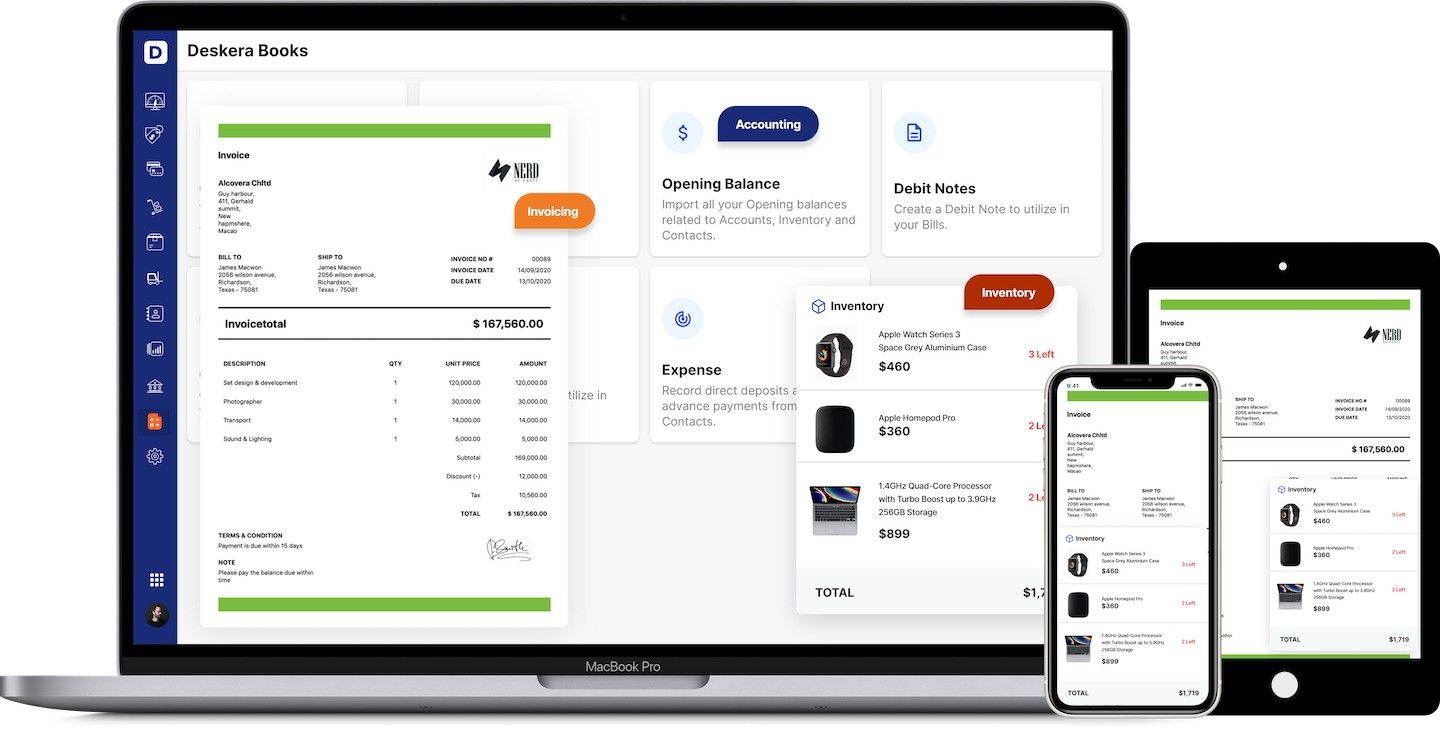
Very often, organizations require multiple formats of sales invoices to be available depending on their target audiences. They may also need these formats to meet the requirements of the contacts they are dealing with. In such a situation, it becomes effortless if the accounting system or the ERP allows users to modify the print templates as per requirements.
4. Report Designer - the report designer should allow users to create customized reports as required by users at all levels. Report designers give users the flexibility to fetch details related to sales & purchase in the required format.
These formats are needed for day to day monitoring of various business operations. Hence, the report designer for any segment helps in making sure the operations are running smoothly.
As mentioned previously, reports are the key to getting insights into the day to day business operations. A simple to use report designer goes a long way in ensuring the business organization gets the correct insights required to improve the business performance year-on-year.
5. Report Filters - the system should be flexible enough to apply filters using the custom fields. This helps any business organization get reports for any micro aspect of the business organization.
As an example, a trader dealing in goods of multiple brands can analyze which brands are selling fastest and which of the brands are not giving good profitability.
Custom filters also allow users to generate project wise, region wise, salesperson wise, etc. reporting, which gives insights into each aspect's profitability.
6. Alerts and Notifications - they form a crucial part of day to day business processes. Alert configuration should be allowed at the user level such that any user can define the event for which they want to receive a notification.
Timely alerts are the key to running a successful business organization. They help keep your receivables in check, expired stocks monitoring, important dates & events, efficient stock level management, etc.
7. Statutory Compliance - this is a must-have requirement for the system to be 100% compliant with the country's statutory requirements.
Preparing statutory returns is a cumbersome task, and any growing business needs timely taxation returns to be filed. If automated, this process saves a lot of time, effort, and money for the organization.
8. Inventory Management - the inventory management module should support all inventory types - serialized, batches, SKU, multiple UOM, etc. The system should also allow the user to define important attributes like reorder level, reorder quantity, etc.
A robust and flexible inventory management module is the key to most business segments dealing in trading or manufacturing. Greater is the ease of using and tracking the inventory faster is the speed of business operations in any segment.

Hence, the inventory module must allow users to get detailed reports of all aspects related to inventory. This may include stock levels, stock valuation, stock movement, warehouse wise reports, batch & serial wise reports, etc. These reports should also support multiple search filters to be applied to get information related to any aspect of the business operation.
9. Open to Integration - another critical aspect is that the ERP should be easy to integrate with other apps & tools in the ecosystem. This ensures that the user can link the system with any other application.
In today's time, the strength of a business application lies not only in its features but also in its ability to interact with other ecosystem applications.
10. Mobile App - This has become a very crucial aspect of every business' day today. If a mobile app can be designed to handle all processes with ease, it can offer far greater flexibility and ease of use. Businesses today require fast-paced operations that can be managed with a simple user interface.
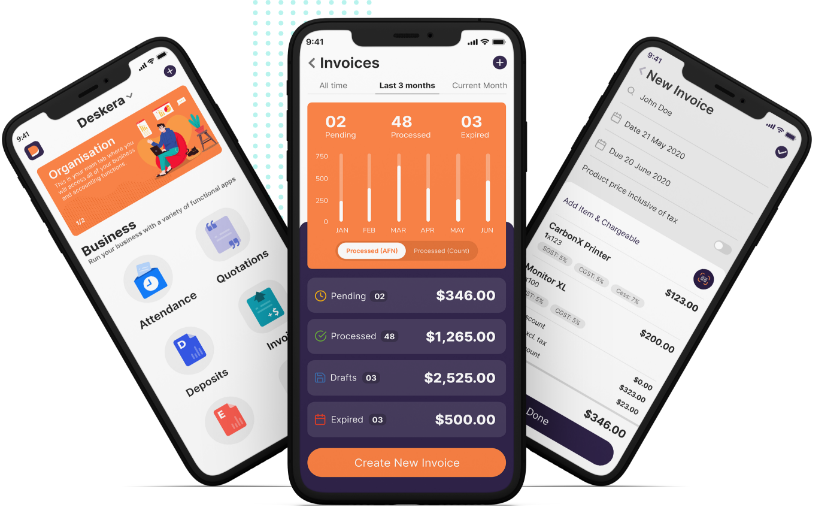
Hence, it is essential to provide an interface that the users are familiar with. Considering most users are comfortable using mobile phones, it has become very important to provide a similar user interface for the accounting systems.
These are some of the crucial aspects that can make any ERP flexible enough to handle the requirements of any segment. What is important from here onwards is configuring the systems correctly and adhering to the right methodology while using these systems.
Wrapping Up
Business benefits aside, ERP gives an information system three important capabilities: Consistency and reliability of data across the organization, streamlined transaction processing, provides operations level reporting.
These capabilities, basic and important as they are, ensure that companies are ready for specific solutions that enhance and improve performance.
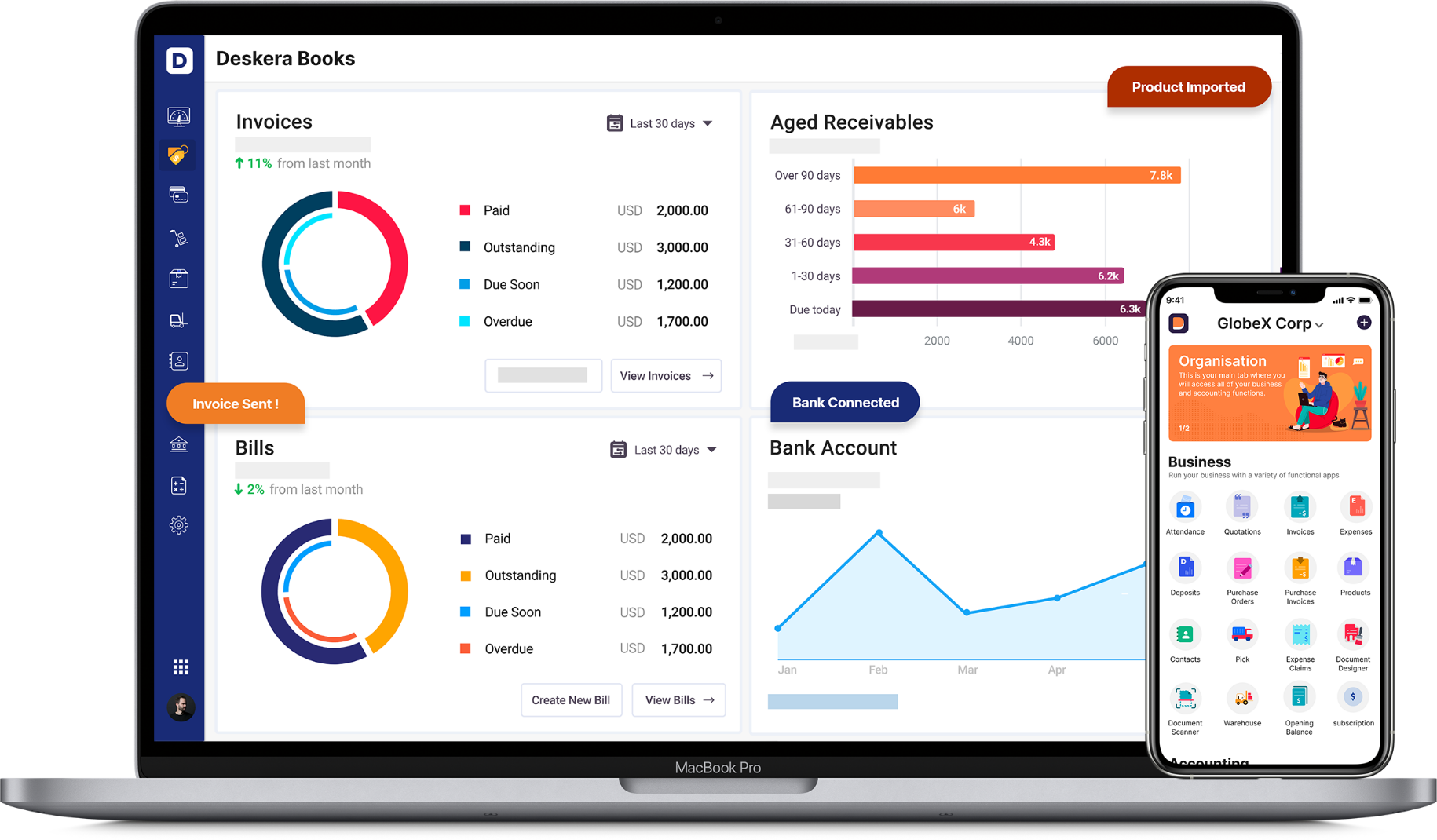
To build a sustainable, scalable enterprise in today's business environment, you need to use tools that help you streamline tasks, boost productivity, and leverage data in real-time. The right ERP system, like Deskera can put you on the right track.
How Deskera Can Assist You?
Deskera's integrated financial planning tools allow investors to better plan their investments and track their progress. It can help investors make decisions faster and more accurately.

Deskera Books enables you to manage your accounts and finances more effectively. Maintain sound accounting practices by automating accounting operations such as billing, invoicing, and payment processing.
Deskera CRM is a strong solution that manages your sales and assists you in closing agreements quickly. It not only allows you to do critical duties such as lead generation via email, but it also provides you with a comprehensive view of your sales funnel.
Deskera People is a simple tool for taking control of your human resource management functions. The technology not only speeds up payroll processing but also allows you to manage all other activities such as overtime, benefits, bonuses, training programs, and much more. This is your chance to grow your business, increase earnings, and improve the efficiency of the entire production process.
Final Takeaways
We've arrived at the last section of this guide. Let's have a look at some of the most important points to remember:
- Businesses that are growing have a lot to worry about when it comes to monitoring and managing their rising inventory levels.
- Using barcoding, RFID tags, and serial numbers, ERP keeps track of your inventory at every stage of the supply chain.ERP systems can help businesses to allocate resources more effectively by providing real-time visibility into resource availability, such as labor, machinery, and raw materials. This helps businesses to optimize resource usage, reduce waste, and improve efficiency.
- ERP also manages your fixed assets and Bill of Materials (BOM). Users may simply create and amend BOMs with this software, and they can also keep track of all past adjustments. With the help of fixed asset management, users may schedule equipment maintenance to reduce unscheduled downtime, increasing profitability and relationships with your supply chain.
- The employment of conventional methods makes avoiding boring activities impossible. It used to take hours for employees to do duties like processing orders, managing timesheets, preparing reports, and monitoring inventory levels.
- These procedures not only take time, but they also lower staff morale and put you at risk for mistakes made by people.
- the ERP should offer a simplified solution to the warehouse team to track inventory reports and understand the stock level of each SKUs to be maintained. Their inventory masters also require multiple attributes to be able to generate MIS reports later on.
- By giving ecommerce businesses real-time visibility into inventory levels, supplier performance, and delivery schedules, ERP systems can help them manage their supply chains more successfully. This can assist businesses in reducing lead times, increasing customer satisfaction, and optimizing their inventory levels.
Related Articles



